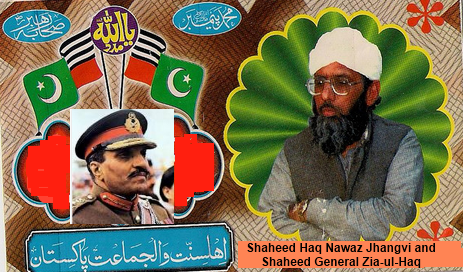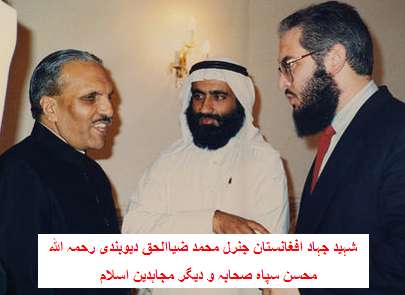Sipah-e-Sahaba is not an outcome of class war between Sunnis and Shias of Jhang – Nazir Naji
In this article pubished in Urdu daily Dunya, veteran Pakistani columnist Nazir Naji exposes and debunks the misleading myth/disinformation spread by certain pseudoliberal and Deobandi Islamist circles that the banned Deobandi terrorist group Sipah-e-Sahaba Pakistan (SSP, currently operating as LeJ and ASWJ) emerged in 1980s in Jhang, Punjab as a result of alleged oppression of poor Sunni farmers and underclass by powerful Shia feudals and landlords.
Naji sahib argues that far from class struggle, Sipah-e-Sahaba’s creation was a result of Pakistan Army Chief General Zia-ul-Haq’s well-planned policy to empower the Deobandi cult in Pakistan as Jihadist proxies of Pakistan army which also enabled organized sectarian violence against Shias and Sunni Barelvis/Sufis by Deobandi militants. Naji sahib hints that the division in Jhang was largely ethnic and linguistic (Mohajir vs locals) not Sunni vs Shia. This point is particularly important given that a significant number of migrants (Mohajir) from India who settled in Jhang and other parts of Pakistan were affected by intolerant and violent ideology of Deobandi cult.
Previously senior Pakistani bureaucrat Tariq Khosa, former DG of FIA revealed the links between General Zia-ul-Haq and Deobandi terrorit outfit Sipah-e-Sahaba. General Zia-ul-Haq personally intervened for Haq Nawaz Jhangvi’s release: https://lubpak.com/archives/229150
Even Khaled Ahmad who used to write for The Friday Times has discussed the distortions of the situation in Jhang by ostensibly Ziaist narrators. Khaled Ahmad notes that the situation in Jhang before Partition (1947) was of Shias and Sunnis living in relative harmony and participating in each others important occasions. Intermarriage between the two main sects was the norm and not the exception. Post Partition, the demographics of Jhang were radically altered. The migrants who came from Indian Punjab were overwhelming belonging to the more hardline Deobandi school of thought as opposed to the indigenous Sunni Barelvi/Sufi population of Jhang. Morever, Shias and Sunnis were close to equal in terms of population breakdown in Jhang before Partition. The original residents of Jhang, be they Shia or Sunni (Barelvi), were mostly agrarian and therefore by definition owned land in varying proportions. There were both Shia and Sunni (Sufi-Barelvi) landlords as well as smaller landowners. The Deobandi migrants were not exactly oppressed and persecuted; in fact they quickly became dominant within the trader communities in Jhang.
The simplistic and intellectually dishonest binary of positing the origin of the Sipah Sahaba as a class struggle is negated by the facts. If the Sipah-e-Sahaba was a class struggle, why was their agenda purely sectarian as there is no mention of Marx or Lenin in their narrative. Similarly, why was it that until the advent of General Zia ul Haq, the increasingly financially prosperous Deobandis of Jhang were never able to wreak the sectarian damage that they did post Zia. If SSP-ASWJ was an class phenomenon, why didn’t Deobandis of Muzaffargarh, Bahawalpur and Dera Ghazi Khan revolt against Sunni fuedals and landlords of those areas?
Of course, those pro-establishment commentators who postulated this rubbish like the polemicist Israr Ahmad failed to mention that it was General Zia’s Deobandi/Salafi Sharia courts that overturned the late Zulfikar Ali Bhutto’s land reform acts. The Sipah Sahaba was and continues to be a purely fascist and sectarian organization whose narrow agenda is to enforce their hardline views on the rest of Pakistan.
Naji sahib’s column reminds us that despite misleading discourse by dishonest media and human rights groups, genocide of Shias and Sunni Barelvis at the hands of Deobandi terrorists (variously operating as SSP, ASWJ, LeJ, TTP etc) cannot be described as Sunni-Shia sectarian violence, and that a large number of Sunnis and Shias happily accept and coexist with each other.
http://dunya.com.pk/index.php/author/nazeer-naji/2014-05-10/7031/75568471#.U25prvldVlx





نظیر ناجی صاحب ٹھیک ہی کہتے ہیں ….
اگر یہ سپاہ صحابہ یا فرقہ واریت کسی کمزور لوگوں کے سے شروع ہوتی تو کوئی حیرت نہیں ہوتی
کیونکہ یہ سب ریشہ دوانیاں تو تھکے ھوے لوگوں کا کھیل –
لگتا ہے جھنگ والوں کو کوئی اور کام نہیں تھا
بہر حال جیسا بو یا ہے ویسا ہی کاٹیںگے جھنگ والے بھی اور باقی سب بھی